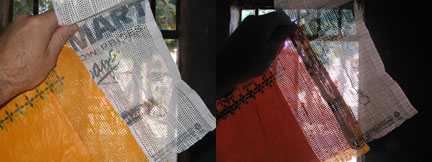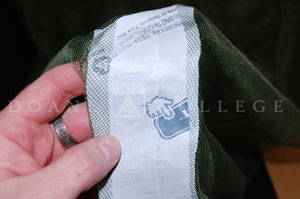Making mosquito nets from shopping bags.
Breaking the Chain of Dependence
Give a man a fish, and you feed him for a day;
Teach a man to fish, and you feed him for a lifetime.
Our overarching goal is to "break the cycle of dependence." This is achievable by meeting our three goals of saving lives, creating jobs, and cleaning the environment. This project teaches people how to take waste plastic and easily turn it into mosquito nets. People who make the nets can help prevent malaria in their families, sell additional nets for income, and clean the environment by making the nets out of recycled plastic. View the video on making your own nets.
How we do it:
The base material is made out of eight layers of plastic bonded together by heat from a household iron. Get details on making the base material.
| In the villages of Karandi we used coal box irons to make the base material as no electricity is available. |

This base material is extremely strong and can be use for a wide variety of projects including mosquito nets. The holes for the net are generated by making a modified sewing machine needle and using electric or treadle sewing machines.
|
Image

|
| You can see us shaping the needle with a triangle file and using it with a treadle sewing machine. Get specific instructions on making the modified needle. |
Here are samples of the Doane Nets.
|
Image

|
| The orange sample on the left was made in Africa. Compare that to the white sample on the right made in the US. |
Damaged nets (manufactured and homemade) can be fixed in minutes simply by patching holes with scraps of plastic and an iron.
|
Image

|
| This is a double sided patch and is a quick permanent fix to a damaged net. |
This project is simple to understand, simple to do, and easily deployable. The world only needs to be taught.
The teachers:
This group of 25, mostly subsistence farmers (now expanded to 50), formed the first conservation self-help group in Kenya. They are now the world’s experts on converting plastic bags into mosquito nets.
|
Image

|
|
| Collecting plastic in the local village. | The members of the group in attendance on the day the group was officially formed. |
By sending these world experts out to educate others, we can canvas almost all of Kenya for very little money. In fact we can cover Kenyans with nets for less than $0.05 per person.
